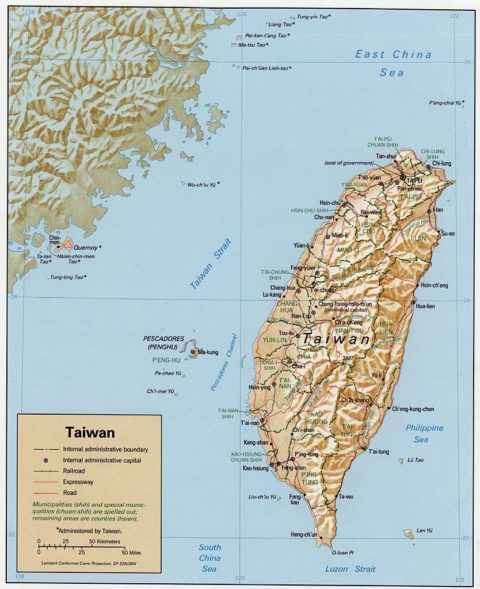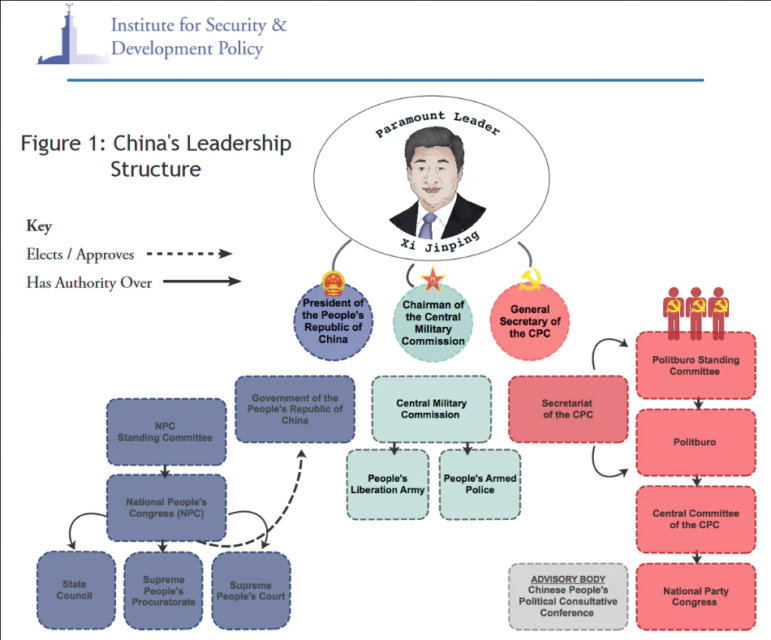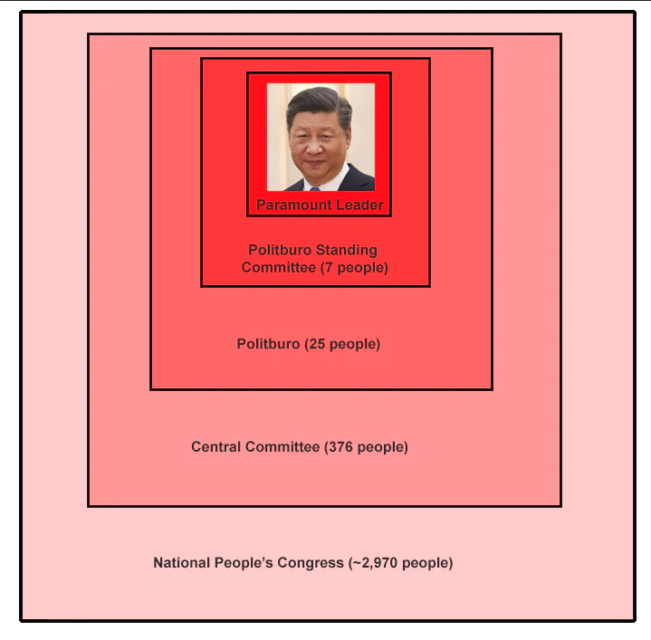spiked
Published 5 Aug 2022The spiked team discusses the rise of Britain’s thoughtpolice, Nancy Pelosi’s Taiwan trip and Beyoncé’s act of self-censorship.
(more…)
August 6, 2022
Britain’s woke Stasi | The spiked podcast
July 28, 2022
Is the US Navy in crisis?
CDR Salamander outlines why he is very concerned about the current state of the United States Navy:

US Navy ships from the John C. Stennis and Nimitz Carrier Strike Groups with ships from the Bonhomme Richard Expeditionary Strike Group in the Gulf of Oman, 22 May 2007.
US Navy photo by Mass Communication Specialist 1st Class Denny Cantrell via Wikimedia Commons.
If you believe the threat from China is overblown, our Navy is well led, and that our fleet is big enough, then this is not the post for you. If you are concerned for all of it, grab a fresh drink and dive right in.
We are facing of something our nation has not had to seriously consider in well over three decades; we do not have free and unfettered access to the sea.
Even when Soviet submarines roamed the world’s oceans at will – though closely watched – and the Red Banner Fleet could send battle groups on cruises through the Gulf of Mexico, we had fair confidence in one thing – the Pacific was an American lake.
No more.
The leaders of the USN seem to have very different notions about what the Navy needs:
f you feel the Navy needs a larger share of the budget to meet the challenge of China, then you need to advocate for it. You need to fight for it … and when I say “you” I mean “we” and the most important and powerful parts of that “we” are our institutions; our maritime power institutions dedicated to seeing the USA remain the premier seapower.
Let’s start with the most obvious. Our uniformed Navy is itself an institution. It reports to its civilian leadership in the Executive Branch with oversight from the Legislative Branch. There are your big pixel maritime governmental institutions; the uniformed and civilian leaders in the Department of the Navy.
As reviewed yesterday, the CNO is engaged in a rather low-energy talking point about 500-ships, but in 2022 that is not even remotely achievable. He knows it, you know it, Congress knows it as well. A number is not an argument, and yet he is investing personal and institutional capital on this line that is almost immediately ignored if it is heard at all. Why?
In the last year one of his highest profile public appearances was when he shoveled heaping piles of personal and institutional capital in a fight defending a red in tooth and claw racial essentialist Ibram X. Kendi against who would normally be the US Navy’s natural allies in Congress. Ultimately he lost that battle and removed Kendi’s racist book and others from his reading list, but in the face of everything else going on in the maritime world, why?
What about the Vice CNO, Admiral William K. Lescher, USN? Maybe he could throw some sharp elbows for the maritime cause? Sadly, not. Just look at his exchange with Rep. Mike Gallagher (R-WI) back in March. He seems to be the “Vice Chief of Joint Force Operations” more than anything else. He is focused on something, but advocating for sea power is not it.
With the night orders from the CNO and VCNO as they are, if you expect any significant advocacy from the uniformed Navy leadership who report to them for — checks notes — the Navy, you are going to have to wait for a long time, time we don’t have. It isn’t going to happen.
[…]
Take a moment and ponder – when was the last time you heard the SECNAV or Under out front on The Hill or to the greater public about our maritime requirements? Yes, I fully understand what goes on behind closed doors, but that slow roll in an ever-slower bureaucracy infested with scoliotic nomenklatura is well past being of use. The American people must be provided the information and motivation to understand how their entire standard of living – and to a great extent their freedoms – is guaranteed by our mastery of the seas. Is even a rudimentary effort being made in this regard?
Just look at the USN’s YouTube feed – a primary communication device for the American people. What has the SECNAV talked about there this year? LGBTQ+ Pride Month, Juneteenth, Army birthday, Asian-Pacific Islander Month, Mental Health Awareness Month, Women’s History Month, carrier air birthday, and Black History Month.
There you go. There’s your communication. Dig harder if you want … but if you read CDRSalamander and you are not readily aware, then imagine the general population’s situational awareness of the dragon just over the horizon.
July 9, 2022
QotD: Chinese “technocracy”
For a while, all (or almost all) of China’s top officials had engineering degrees.
When Xi Jinping first joined the Politburo Standing Committee in 2008, eight of its nine members were engineers. Paramount Leader Hu Jintao was a hydroelectric engineer. His second-in-command Wen Jiabao was a geological engineer. There were two electrical engineers, a petroleum engineer, a radio engineer, and two chemical engineers (including Xi himself). The only non-engineer was Li Keqiang, an economist.
And this was actually a low point in engineers’ dominance of Chinese power. The term before, 100% of Politburo Standing Committee officials had been engineers! What’s going on?
For one thing, Deng Xiaoping thought engineers were cool, and he was powerful enough to do whatever he wanted. A government made up entirely of engineers? Sure, whatever you say. And since the top echelons of Chinese government appoint their own successors, these engineers could appoint other engineers and so on.
But also: during the Cultural Revolution, about half of Chinese people who got degrees at all got engineering degrees. The Cultural Revolutionaries were really not big on education (according to one article, “Xi’s secondary education [was cut short] when all secondary classes were halted for students to criticise and fight their teachers.”) But engineering was useful for building factories, and so was grudgingly tolerated. That meant that of the people smart and ambitious enough to get into college at all, half did engineering.
The other half? I’m not sure. Law is a popular major for would-be politicians in the US, but here’s a Chinese person explaining why it doesn’t work that way in China (short version: China doesn’t have great rule of law, so lawyers don’t matter much and are low status).
Here is an article telling us not to take China’s engineer-kings too seriously. It argues that (aside from Deng’s original picks), most of them never did much engineering, and just studied the subject in school as a generic prestigious-sounding degree to springboard their government career. Chinese engineering curricula are easy, and powerful people frequently cheat or pay others to write their dissertations.Aside from a few of Deng’s personal picks, we should think of this less as “China is a magic place where rational scientists hold power”, and more as “for idiosyncratic reasons, social climbers in China got engineering degrees.” Certainly none of these people were selected for the Politburo on the basis of their engineering acumen. They got their power by bribing, flattering, and backstabbing people, just like everyone else.
In any case, Xi’s old Politburo class was the last one to be made primarily of engineers. The current Politburo has only one engineer — Xi himself.
Scott Alexander, “Dictator Book Club: Xi Jinping”, Astral Codex Ten, 2022-04-07.
July 5, 2022
The Republic of China’s “Porcupine strategy”
Originally published in the New York Sun and reposted by the New English Review, Conrad Black believes any attempted amphibious invasion of Taiwan will become the worst invasion outcome since the Athenians assaulted Syracuse in 414-413 BC:
There has for some time been a good deal of flippant talk about a Communist Chinese invasion of the Republic of China on Taiwan, as if that would be a simple military undertaking. It seems to be inadequately appreciated that Taiwan has thought of little else for many years, and is, unlike Ukraine, a very prosperous and technologically sophisticated country that is armed to the teeth with the most advanced American weaponry, and has plotted out a defense in depth that is called its “porcupine strategy”.
Though it is probably accidental, “porcupine” is the word applied to Switzerland by Adolf Hitler in 1941, when, after careful analysis by the German General Staff, he concluded Swiss defenders would inflict a much larger number of casualties on a German invasion force than could possibly be justified by the occupation of the country. (It can be lamented that more recent Western strategists did not apply the same test to Afghanistan.)
Comparisons with Ukraine are inapplicable, other than the fanatical determination of the defenders. Most obviously, Taiwan is not only an island but the Formosa Straits are three to four times as wide as the English Channel from the southern British ports to the beaches of Normandy. The People’s Republic of China would have no choice but to attack amphibiously as they could not possibly imagine success with fewer than 500,000 combat soldiers and no force remotely as large could be parachuted onto Taiwan.
A strike force of 500,000 would probably have to be supplemented by a follow-up force at least as large, all conveyed in a huge armada of slow and vulnerable craft. Taiwan has been supplied with the precise ground and air-launched missiles that the Ukrainians have used to such deadly effect in the Black Sea, including the sinking of the Russian flagship, the heavy missile cruiser Moskva.
Taiwan has a front-line Air Force of about 300 of the latest fully equipped fighter and interceptor aircraft that along with shore batteries could rain a dense and prolonged fire of missiles upon any invasion fleet. Such a fleet, even in the best of weather, would plod through open water for at least ten hours. They would be sitting, or at least slowly moving, ducks throughout that journey. It brings to mind the conclusion of one of Churchill’s Demosthenean addresses in the autumn of 1940: “We are still awaiting the long-promised invasion; so are the fishes.”
June 12, 2022
Eisenhower Lays Out His Plans for Sicily – WW2 – 198 – June 11, 1943
World War Two
Published 11 Jun 2022The Allies bomb Mediterranean islands in preparation for their invasion of Sicily next month; they also prepare a lot of deceptions to mislead the enemy as to where they will attack. The German plans for the summer offensive against the Kursk salient are ever more concrete, and in the field this week, the Chinese stop the Japanese offensive cold.
(more…)
June 5, 2022
Banzai Charges in Alaska – WW2 – 197 – June 4, 1943
World War Two
Published 4 Jun 2022The Chinese defeat the Japanese at Shipai Fortress and the Americans maul the Japanese in the Aleutians. The Japanese are also worried about the possibility of the USSR joining the war against them. Meanwhile the Allies still plan to invade Sicily, but have no idea what they’ll do after that.
(more…)
May 29, 2022
Black May, Nazi Subs Defeated – WW2 – 196 – May 28, 1943
World War Two
Published 28 May 2021German Grand Admiral Karl Dönitz orders the U-Boats to leave the Atlantic this week; the losses lately have just been too great for their patrols to continue there. There is active fighting in China, the Aleutians, and the Kuban, and there are special weapons tests in the skies over Germany.
(more…)
May 16, 2022
Heaviest Air Raid in Human History – WAH 060 – May 15, 1943
World War Two
Published 15 May 2022As the Warsaw Ghetto Uprising is being quashed, there are renewed Japanese atrocities in China, and the RAF sets a world record by bombing German civilians.
(more…)
QotD: The difference between surface meaning and actual intent
A basic truism is that languages don’t map exactly over each other and that’s the most likely explanation for this database from China detailing “BreedReady” women. That languages don’t map exactly should be obvious even to the most monolingual of English speakers. We all know that “Let’s have lunch sometime” when said by an American means “Hope to see you never and definitely not while eating”. Similarly, “That’s lovely” when said by a Brit does not necessarily mean it is lovely and “How quaint” isn’t praise for the cuteness of the thing. A Californian invocation to meet Tuesday is in fact a rumination on the possible non-existence of Tuesday.
Tim Worstall, “That Chinese ‘BreedReady’ Database – Check The Translation”, Continental Telegraph, 2019-03-11.
May 15, 2022
The End of the War in Africa – WW2 – 194 – May 14, 1943
World War Two
Published 14 May 2022With the end of the Tunisian Campaign, the Allies have won the war for the African Continent. What next? They meet at the Trident Conference in Washington DC to try and figure that out. Meanwhile, the fight in the field continues — in Burma, the Aleutians, China, and the Kuban.
(more…)
May 8, 2022
Kilroy was Here! The fall of Tunis – WW2 – 193 – May 7, 1943
World War Two
Published 7 May 2022Tunis falls to the Allies, but the Axis are still fighting back from their little corner of Tunisia. There is more of the seemingly endless fighting in the Kuban in the Caucasus, and the Chinese Theater comes to life with a new Japanese offensive.
(more…)
April 27, 2022
“We’re healthy from the bottom up, and sick from the top down.”
Chris Bray has a bit of fun at David French’s expense:
In the 1830s, British merchants with trade routes from India had forced open an enormous market for opium in China, and were pouring the product into the country, producing a lucrative addiction crisis. (Queen Victoria, the first Sackler.) But the Qing Dynasty had run China with a firm hand since the first half of the 17th century, and the emperors of the dynasty had long regarded themselves as, to use an academic term from the field of political science, The Shit. In 1839, Commissioner Lin Zexu sent a huffy letter to the British monarch, warning her that her tedious little pissant country over there in Nowhereville was trifling with a vast and dangerous power:
Our celestial empire rules over ten thousand kingdoms! Most surely do we possess a measure of godlike majesty which ye cannot fathom! Still we cannot bear to slay or exterminate without previous warning …
The British responded with naval artillery, and the limits of the Qing Dynasty’s power were revealed with the greatest possible clarity. Commissioner Lin had an image of himself, an understanding of his place in the world and the meaning of his nation’s power, that couldn’t survive an encounter with reality.
So: David French. In his own version of Commissioner Lin’s letter, French warns this week that American institutions most surely do possess a measure of godlike majesty which ye cannot fathom, yet ye weak and depraved subjects of these potent institutions offer not thine gratitude. It’s insane. He doesn’t see the world he’s describing, so his description doesn’t have anything to do with the people he’s talking to, and he has no idea.
Before I say anything else, though, I have to point out that I recently described the American crisis like this: “We’re healthy from the bottom up, and sick from the top down.” French does the opposite, describing institutions that are undermined by the dreadful human material beneath them: “Our government is imperfect, but if this republic fractures, its people will be to blame.” Wreckers and saboteurs have undermined the otherwise successful five year plan, you see. The problem is bottom-up.
This is exactly the same beat patrolled by “real conservatives” like Max Boot and Tom Nichols, who endlessly warn that the fat dumb peasants lack the sense to lick the hands of their capable superiors. These are very strange men.
Here, watch French do his thing:
The people disproportionately driving polarization in the United States are not oppressed minorities, but rather some of the most powerful, most privileged, wealthiest people who’ve ever lived. They enjoy more freedom and opportunity than virtually any prior generation of humans, all while living under the protective umbrella of the most powerful military in the history of the planet.
It’s simply an astonishing level of discontent in the midst of astonishing wealth and power.
Tell me the comparison to Commissioner Lin isn’t perfect. Does not our wealth and power astonish you!?!?
As French writes about the privileged creatures who live “under the protective umbrella of the most powerful military in the history of the planet,” the Taliban rules Afghanistan. A reminder: The Taliban controlled about half of that country in September of 2001; then the most powerful military in the history of the planet invaded, and fought the Taliban for two full decades, at the cost of thousands of lives and trillions of dollars, the result of which is that the Taliban now controls … all of the country. The implosion of the American effort in Afghanistan happened last fucking year, and we’ve somehow already taken care to forget the details of that goat rodeo. What was the plan?
April 25, 2022
The Jews Fight Back – WAH 057 – April 24, 1943
World War Two
Published 24 Apr 2022The war against Naziism is escalating on all fronts — in the War Against Humanity the main battleground is now the Warsaw Ghetto.
(more…)
April 9, 2022
It wasn’t the Wuhan Coronavirus that crippled the world economy — it was government reaction to the pandemic
Dan Sanchez points out the undeniable truth that most of the economic damage we’ve sustained over the last two years wasn’t due to the pandemic itself, but to the incredibly disruptive public health measures almost every western government implemented in response (with huge connivance on the part of the legacy media and the social media companies):
… it will not be the coronavirus making us poorer, but the fallacy, embraced by officials from Beijing to DC, that central planners can manage society-wide problems, like “healing” a global pandemic or “fixing” a global supply chain.
As the great economists Ludwig von Mises and F.A. Hayek explained, societies and economies are inconceivably complex, and it is literally impossible for anyone to centrally plan something so far beyond their comprehension. To think otherwise is, as Hayek called it, a “fatal conceit”.
The fatal conceit of central planners is manifest in the very term “global supply chain”. The metaphor of a “chain” portrays the economy as something static and linear: something simple enough for a single mind to “fix”.
But, as Leonard Read vividly showed in his classic essay “I, Pencil”, even a seemingly simple good like a pencil is not the product of a single supply chain. Every good in the economy is descended from a vast “family tree” of innumerable factors of production. And all the family trees of all goods are intricately interconnected, making the economy, not a “chain”, but as economist Murray Rothbard depicted it, “a highly complex, interacting latticework of exchanges”.
This vast, dynamic latticework is self-healing and self-fixing: through the actions and interactions of its constituent individuals. Blundering, arrogant central planners only get in the way and make things worse.
That has been the lesson of free-market economists and social theorists going back to Adam Smith. The western world partly embraced that lesson, and it flourished as a result, becoming a beacon to the world. Starting in the 1970s, even Communist China emulated its example, opening up its markets. This was a humanitarian miracle for the Chinese people and a boon for us all. If not for Chinese manufacturing being integrated into the global division of labor, it is hard to imagine the west having the modern high-tech living standards and super-comfortable working conditions we enjoy (however precariously) today.
Whereas once China liberalized in emulation of the west, now the leaders of the “free world” are emulating (and, in the case of Canada’s prime minister, openly admiring) the authoritarianism of the CCP. As crises continue to mount, it is clear that this turn toward tyranny is putting our future at risk.
April 8, 2022
The structure of the Chinese government
Scott Alexander reviews The Third Revolution, by Elizabeth Economy, although as he says up front, “It’s a look through recent Chinese history, with The Third Revolution as a very loose inspiration.”:
How Does China’s Government Work?
The traditional answer is a flowchart like this one (source):
But you could give a similarly convoluted flowchart for America, and it would tell people much less than words like “democracy” or “balance of powers”. What’s the Chinese equivalent?
I found it a little more helpful to see it diagrammed it as a series of nested squares:
The inner levels have real power, and the outer layers are theoretically overseers but actually rubber stamps. Things get more and more rubber-stampy as you go out, culminating in the National People’s Congress, which recently voted to re-elect Xi by a vote of 2,970 in favor, 0 against — it’s so irrelevant that it’s literally called “the NPC”.
Who chooses the members of the inner groups? In theory, the outer groups; for example, the Central Committee is supposed to elect the Politburo Standing Committee. In practice, these selections tend to be of the “2,970 in favor, 0 against” variety, so they must be taking marching orders from someone. Who? The Chinese government doesn’t talk about it much, but probably the members of the Politburo Standing Committee hand-pick everyone, including the Paramount Leader and their own successors.
How do they pick? Mostly patron-client relationships. Every leading politician cultivates a network of loyal supporters; if he takes power, he tries to put as many of his people into top posts as he can. The seven Politburo members wheel and deal with each other about whose clients should get which positions, including any unoccupied Politburo seats.
If the two word description of US politics is “democracy, checks-and-balances”, then the two word description of Chinese politics is “oligarchy, patrons-and-clients”. If this seems exotic, it shouldn’t: it’s not much different from how the US fills unelected posts like “ambassador” and “White House staffer”. The Trump presidency put this into especially sharp relief, either because Trump did it more blatantly than usual or just because Trump’s clients were so obviously different from the normal Washington crowd. Consider eg the appointment of Jeff Sessions (among the first Congressmen to endorse Trump) as Attorney General.
In the US, this is a peripheral part of the system, checked by democracy. In China, it’s the whole game.








